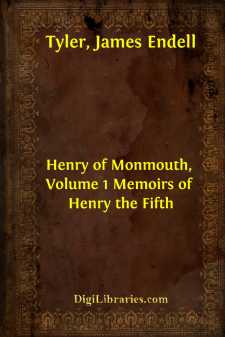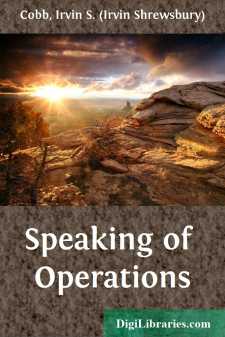Non-Classifiable
- Non-Classifiable 1768
Non-Classifiable Books
Sort by:
by:
Gleeson White
CHILDREN'S BOOKS AND THEIR ILLUSTRATORS. BY GLEESON WHITE.There are some themes that by their very wealth of suggestion appal the most ready writer. The emotions which they arouse, the mass of pleasant anecdote they recall, the ghosts of far-off delights they summon, are either too obvious to be worth the trouble of description or too evanescent to be expressed in dull prose. Swift, we are told...
more...
PREFACE. Memoirs such as these of Henry of Monmouth might doubtless be made more attractive and entertaining were their Author to supply the deficiencies of authentic records by the inventions of his fancy, and adorn the result of careful inquiry into matters of fact by the descriptive imagery and colourings of fiction. To a writer, also, who could at once handle the pen of the biographer and of the...
more...
by:
Jacob Abbott
The Boy that was not loaded. In the course of his travels in Europe, Rollo went with his uncle George one summer to spend a fortnight in Scotland. There are several ways of going into Scotland from England. One way is to take a steamer from Liverpool, and go up the Clyde to Glasgow. This was the route that Mr. George and Rollo took. On the way from Liverpool to Glasgow, Rollo became acquainted with a...
more...
INTRODUCTION Such was the spirit in which the exploration of the world was accomplished. It was the inspiration that carried men of old far beyond the sunrise into those magic and silent seas whereon no boat had ever sailed. It is the incentive of those to-day with the wander-thirst in their souls, who travel and suffer in the travelling, though there are fewer prizes left to win. But "To travel...
more...
by:
Joseph Bell
PLATE I.1.Ligature of Aorta—Sir A. Cooper's incision.2.Ligature of Aorta—South and Murray's incision.3.Ligature of Common Iliac.4.Ligature of External Iliac—Sir A. Cooper's.5.Ligature of Femoral in Scarpa's triangle.6.Ligature of Femoral below Sartorius.7.Ligature of Innominate.8.Ligature of third part of Left Subclavian.9.Ligature of Axillary in its first part.10.Ligature of...
more...
by:
Jacob Abbott
Mary's Childhood. 1542-1548 Travelers who go into Scotland take a great interest in visiting, among other places, a certain room in the ruins of an old palace, where Queen Mary was born. Queen Mary was very beautiful, but she was very unfortunate and unhappy. Every body takes a strong interest in her story, and this interest attaches, in some degree, to the room where her sad and sorrowful life...
more...
GENERAL PREFACE TO THE SERIES If there is one quality which more than another marks the demand of the present day it is the requirement of novelty. In every direction the question which is asked is not, "Is this fresh thing good? Is it appropriate to, and well-fitted for, its intended uses?" but "Is it novel?" And the constant change of fashion sets a premium upon the satisfaction of...
more...
Now that the last belated bill for services professionally rendered has been properly paid and properly receipted; now that the memory of the event, like the mark of the stitches, has faded out from a vivid red to a becoming pink shade; now that I pass a display of adhesive tape in a drug-store window without flinching—I sit me down to write a little piece about a certain matter—a small thing, but...
more...
by:
Isaac Newton
CHAP. I. Introduction concerning the Compilers of the books of the Old Testament. When Manasses set up a carved image in the house of the Lord, and built altars in the two courts of the house, to all the host of Heaven, and us'd inchantments and witchcraft, and familiar spirits, and for his great wickedness was invaded by the army of Asserhadon King of Assyria, and carried captive to Babylon; the...
more...
More than that of any other modern people French art is a national expression. It epitomizes very definitely the national æsthetic judgment and feeling, and if its manifestations are even more varied than are elsewhere to be met with, they share a certain character that is very salient. Of almost any French picture or statue of any modern epoch one's first thought is that it is French. The...
more...











